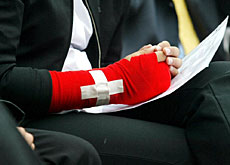Swiss remain competitive despite ratings slip

Switzerland has slipped down another place in the global league of “most competitive nations”, but still ranks in the top ten.
In its latest Global Competitiveness Report, the Geneva-based World Economic Forum noted that the country’s “inefficient bureaucracy” was stifling economic progress.
The 2004-2005 report, published on Wednesday, saw Switzerland drop one place to eighth – after slipping from sixth the previous year.
Finland headed the rankings for the second year in a row, with the United States in second place.
The authors said Switzerland scored highly in terms of its national credit rating, political stability, low inflation, low corruption levels and lack of crime.
But the report found there were still many areas where Switzerland fell down.
“The principal brake on Swiss commerce comes from an inefficient bureaucracy,” said Augusto Lopez-Claros, director of the WEF report.
“The high costs of its agricultural policy, the negative impact of customs barriers and the inequality of salaries between men and women [are also factors],” he added.
Other criticisms included insufficient access to capital markets and “restrictive” employment legislation.
Disappointing
While disappointing, the Swiss result is an improvement on a rival league table published earlier this year.
Lausanne-based business school IMD, in its World Competitiveness Yearbook in May, relegated Switzerland from ninth place to 14th – the first time the country had lost its top-ten ranking.
Reacting to the latest ratings slip, Swiss economic commentators said they wouldn’t be losing too much sleep. But, equally, they promised to take the message on board.
“These reports draw attention to weak points in terms of framework conditions, and they have a certain importance for the political agenda of a country,” said Rudolf Walser, chief economist of the Swiss Business Federation, economiesuisse.
“This is a signal, from an outside point of view, which we will take into account, but without taking it too literally.”
Walser, however, disagreed with the criticism that Swiss labour laws were too restrictive, saying many studies had found the opposite.
Worried
But other commentators went even further. Beat Kappeler, a journalist at the Zurich-based “Neue Zürcher Zeitung” newspaper, said that while he was not surprised by the findings, he was worried by them.
He said one of the big problems facing the country was that taxation had not risen, unlike in other countries such as Ireland.
Kappeler agreed that bureaucracy was a big problem in Switzerland and that there were far too many regulations which slowed down progress
He said the country had also failed to modernise its economy.
Finns first
The WEF report placed Finland first, thanks largely to its excellent macroeconomic framework conditions, high-quality public institutions and the innovatory capacity of its private sector.
It was followed by the United States, Sweden, Taiwan, Denmark and Norway. The report noted the strong Scandinavian presence in the top ten this year, saying countries from the region had excellent macroeconomic management and were running budget surpluses.
The biggest European disappointment was Italy, which slipped from 26th to 47th place – behind the new European Union member states.
Switzerland’s other neighbours did better, with Germany in 13th place and France in 27th position. Zimbabwe finished bottom of the rankings.
The annual report polled more than 8,700 business leaders in 104 countries and considered factors such as the macroeconomic environment, the quality of public institutions underpinning the development process and the level of technological readiness and innovation.
swissinfo with agencies
Global Competitiveness rankings 2004:
Finland
United States
Sweden
Taiwan
Denmark
Norway
Singapore
Switzerland
Japan
Iceland
The World Economic Forum (WEF) compiled its table after surveying more than 8,700 companies in 104 countries.
In Europe, Germany stayed at 13th position, France fell one position to 27th, Italy slipped back to 47th place, but Britain rose four places to 11th.

In compliance with the JTI standards
More: SWI swissinfo.ch certified by the Journalism Trust Initiative












You can find an overview of ongoing debates with our journalists here . Please join us!
If you want to start a conversation about a topic raised in this article or want to report factual errors, email us at english@swissinfo.ch.